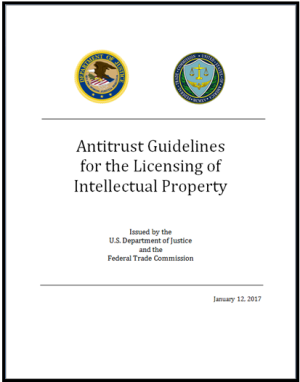Related Content
Press Release
Press Release
This is archived content from the U.S. Department of Justice website. The information here may be outdated and links may no longer function. Please contact webmaster@usdoj.gov if you have any questions about the archive site.
For the past two decades, the Antitrust Guidelines for the Licensing of Intellectual Property have explained how the Department of Justice’s Antitrust Division and the Federal Trade Commission evaluate licensing and related activities involving patents, copyrights, trade secrets and know-how. The Guidelines have played a key role in the department’s investigative and enforcement efforts and guided businesses and courts, having been cited in numerous opinions and government briefs. The principles espoused in the original Guidelines continue to be sound. Nevertheless, developments since 1995 prompted us to undertake the process of modernizing them to reflect changes to the law, as well as the agencies’ recent enforcement and policy experience.


Today, that process is complete and we’re pleased to be issuing the updated Antitrust Guidelines for the Licensing of Intellectual Property. We expect that the Guidelines will continue to play a fundamental role in the agencies’ analysis of the licensing of intellectual property rights and provide guidance to the public and the business community about the agencies’ enforcement approach to intellectual property licensing.
The agencies announced the proposed update of the Guidelines and made it available for public comment in August 2016. As described in that announcement, the proposed update reflected intervening changes in statutory and case law, as well as relevant enforcement and policy work, including the agencies’ 2010 Horizontal Merger Guidelines. During a 45-day comment period, the agencies received public comments from academics, private industries, law associations and non-profit organizations, which are posted here. The agencies carefully reviewed and considered the comments and have now finalized the Guidelines.
The finalized Guidelines continue to be grounded in a flexible effects-based economic analysis. This analysis focuses on evaluating harm to competition, not harm to any individual competitor. The finalized Guidelines reiterate three foundational principles that have guided the agencies’ analysis of intellectual property issues for more than 20 years:
•The agencies apply the same antitrust analysis to conduct involving intellectual property as to conduct involving other forms of property, taking into account the specific characteristics of a particular property right.
•The agencies do not presume that intellectual property creates market power.
•The agencies recognize that intellectual property licensing allows firms to combine complementary factors of production and is generally procompetitive.
The finalized Guidelines also reinforce the agencies’ longstanding view that “the antitrust laws generally do not impose liability upon a firm for a unilateral refusal to assist its competitors, in part because doing so may undermine incentives for investment and innovation.” The finalized Guidelines, which now reflect relevant developments in antitrust and intellectual property law and policy, will continue to guide the agencies, the business community and the public regarding complex issues at the intersection of antitrust and intellectual property law.